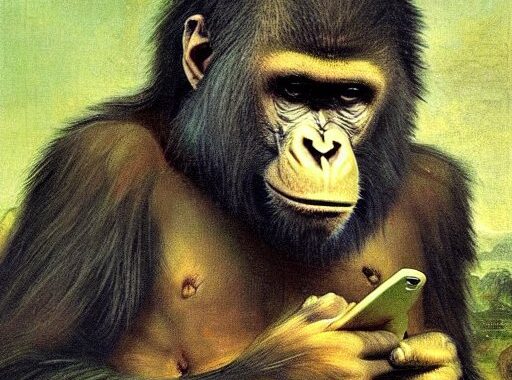Share this
The impact of Technology on Human Psychology
The last 25 years have seen unprecedented change in technologies and fundamentally altered human behaviour, yet we have barely begun to assess the impact of technology on human psychology and development.
The real problem of humanity is the following: we have Palaeolithic emotions, medieval institutions, and god-like technology.
The Impact on Institutions
The Rise of Artificial Intelligence
The Insidious Creep of Technology
About ten years ago, when my children were still at primary school, I started noticing parents pushing their infants around in prams whilst staring at their phones. I wondered what effect this would have on child development. In my own experience, and now backed up by my studies of developmental psychology, we know that babies spend a lot of time studying the faces of their parents. That back and forth interaction between parent and infant is a vital learning experience for children. Who hasn't enjoyed playing 'peek-a-boo' with a baby? You hide your face with your hands and suddenly reveal it to fits of giggles and smiles. Part of the reason for this is that babies have not yet developed a sense of object permanence. In other words, while your face is covered they don't know it's there. When you reveal it, it is a genuine surprise and as long as its a happy face, it's a happy surprise. We can hypothesise that playing this game helps the infant to learn about object permanence. Without learning these fundamental building blocks of psychological experience the world is a very unpredictable and hostile place.
There is another psychological experiment, the 'visual cliff' in which Joseph Campos tested the response of infants to mother's visual cues;
We can see from the experiment how the parental prompts teach the child how to approach uncertainty, they are essentially asking their parent, 'is it safe for me to do this?' This is one small experiment with one particular set of circumstances, but in a single day the infant will encounter multiple scenarios in which they look to their parent to learn how they should act, or feel about objects and creatures they encounter. I recall one calming activity for my eldest son as a baby was to park him up under a tree. He would stare in wonder up at the branches, waggling his arms and feet, then look between me and the tree. It is hard to say precisely what is passing through the child's mind at this moment, but we can say more poetically, that there is a shared experience of wonder at this natural beauty. Add in a passing squirrel and you get the giggles as well.
The Unknown Consequences of Interrupting Development
Then what happens if we start shortening the supply of this interaction? What happens if half the time the infant looks to their parent to share these moments or learn the correct action, the parent is staring at a screen? Technology further interrupts this learning process by such means as placing a tablet and YouTube video in front of children rather than reading to them from a book. This is not interactive. The parent is not paying attention, the child can not look for cues of how to react to the story playing out in front of them. If you have ever read stories to a child, even if you are sitting side by side, you will observe them altering their position at times to look at your facial expression - they need to gauge what you think of the events of the story. What does this denial of learning opportunity do? The truth is we have no idea, but I think we are perhaps beginning to experience the downstream effects in the myriad problems emerging in young adults.
Of course the interruption of normal psychological development does not stop there. Once we start placing devices into the hands of our children, it is interrupting multiple learning experiences throughout childhood, too numerous for the scope of this article. Let's just consider adolescence. We all remember school and the trials and tribulations of those formative years. Most of us experienced the cruelty of other kids, the pain of grappling with complex social issues, which groups you belonged to, who you were beginning to be attracted to, changing bodies that caused confusion and anxiety. This is an incredible period of learning. We all had to deal with those awkward conversations with people we were attracted to, the hot flush of embarrassment, sometimes total humiliation. Or the triumphant, sky-high feeling when our courting paid off and we received that kiss. There is an agony and ecstasy dance that exists as we learn who we are and what body we inhabit and how we communicate to our peers. I say peers deliberately instead of friends, as we also have to learn to communicate with those we don't get along with so well - a vital skill.
Communication, Boredom and Pornography
The smart phone, internet and personal computer represent a massive intervention into that natural process. Time spent with peers, is now spent online. The thousands of hours of practice we enjoyed in communicating with our peers has been vastly curtailed, to be replaced by texting, emojis, discord discussions. It may come as no surprise to hear that at some university events these days, some students may wear badges indicating that they are not open to unsolicited conversation as they may find it too disturbing. This is the generation where many have been brought up without the practice of communication that previous generations enjoyed. They haven't developed that apparatus to tell what a person means when they speak, they don't understand facial expression and body language, because they haven't studied it as they were supposed to. The end result is a sense of overwhelm and confusion whilst participating in conversation, and a potential diagnosis of one of the neurodivergent conditions . Even if kids have avoided these extremes they have been denied the right to boredom - one of the great engines of creativity, as these devices offer endless stimulation.
One form of stimulation that has exploded onto this generation is also the free access to extreme pornography. It is almost unimaginable for previous generations to think what impact this has had on developing brains and adolescent sense of sexual identity. It is no accident that gender issues have become such a hot topic at this moment in history. We all know that the vast majority of pornography does not represent the culmination of any loving relationship between consenting adults. It is the decontextualized grunting, sweating biological culmination shown in ridiculous detail probably not even seen with the naked eye in previous generations. There are estimates that 1 in 3 primary school age children have already been exposed to pornography. What is this exposure going to do? Along with the technology driven 21st century dating scene - Tinder - it is teaching children that relationships are about that act which will seem aggressive, unpleasant, unloving and devoid of respect or self-worth. It is destroying relationships. The fact that younger generation are having less sex is testament to that fact. The agony and ecstasy of courtship, the thrill of the chase, winning someone's heart, has been the bedrock of literature since literature began. It is the stuff of life, the consuming passion of young adults, leading to love and children. What now?
We have carried out an extraordinary experiment on humankind, with our children bearing the brunt of this experiment. There are very few people who have escaped entanglement with this new technology, as it is now a required part of our daily lives. Yet as Tristan Harris of the Centre for Humane Technology has said, social media is first contact with AI. Software engineers set out to maximise 'engagement' so you see more of what you like on your social feeds. What they or anyone else didn't realise was the unforeseen consequences of this grand experiment; The interruption of psychological development, the consequent loss of communication skills and personal identity suffered by the young. The rabbit holes anyone can fall down, the breakdown of trust in sources of knowledge or news, the disruption of democracies. The temptation of a means of manipulation by those in power. This is by no means an exhaustive list and perhaps no one has that list, the results of this experiment will unfold over many years.
Surviving Second Contact
We are just beginning our 'second contact' with AI, as chatGPT and other AI engines are rolled out at incredible speed. The potential unforeseen consequences of this second phase of the experiment are yet to become apparent. We will be dealing with the downstream consequences of first contact for years. It is no understatement to say that it has destroyed many lives already, with many that need to be put back together, and what I try to do in my practice. What can we poor apes do in the face of this exponential growth in a technology that is smarter than us? Set it down. Refuse to be reliant on it as far as possible. Go out and meet with your friends face-to-face. Practice communication every day and give up doom-scrolling. Enjoy the analogue life as much as possible, lie on grass, watch bees visit flowers, play with the dog or the cat. Feed birds in your garden and grow seeds on your windowsill. Plunge your hands into the earth and marvel at the creation we were born into. It is incalculably more incredible that the attention seeking festival of shallowness that fills up your timelines, and so much better for your mind.

